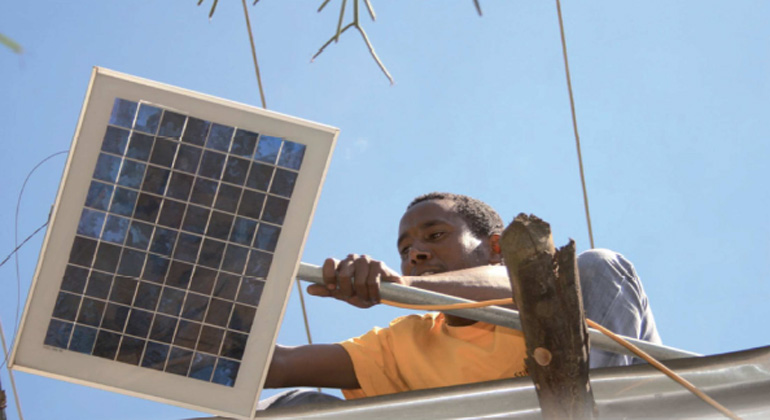How to solve the double gap for solar entrepreneurs
I met Emmett in May 2015 in East Africa. Emmett is 29 and electrical engineer. For two years he worked in a local representation of an Asian manufacturer of Plug & Play products. By Harald Schützeichel
The potential of solar energy for the off-grid power supply of rural households fascinated him so much that he de-cided a few months ago to become self-employed and to start his own solar company. But with this he wants to sell not only Pico Systems but proper Solar Home Systems (SHS), which allow house-holds a full power access. The capital for the establishment of the company was borrowed from friends and relatives.
In a very short time, Emmett has found 30 households that wanted to buy a SHS from him. Emmett also knows why he so quickly found customers: on the one hand, he offers individual solutions, on the other hand, during his time with the previous solar company, he has achieved the reputation of a reliable and trustworthy partner. “Confidence is the key to win customers in off-grid regions,” says Emmett.
Early stage gap
His problem now: How will he find the products? He has two options: either he buys the standard products from one of the currently marketed SHS manufacturers and subsequently modifies them so that they meet the requirements of his customers. Or he buys together the separate compo-nents from the local dealers. But both options are difficult to implement because the quality of locally available components that he needs for his own SHS as well as for the modification of stand-ard products, does not meet his demands. And in order to approach by himself manufacturers from abroad, Emmett is lacking not only the contacts, but also the order volume to be taken seriously by these manufacturers. What are already 30 SHS? For Emmett certainly a lot – for manufacturers and wholesalers not even peanuts.
But even if he would find a supplier: how should he pay him? As a young company, that places its first order by a manufacturer, he will have to pay 100% in advance. So Emmett needs a loan. Of course, none of the local banks is willing to, because Emmett cannot provide collaterals. He also works in an absolute pioneer industry, making banks more risk-averse. Also Impact Funds, Business Angels and Crowdfunder from abroad, who are so active in Africa, have waved aside: he is suppos-edly too small to justify a due diligence, and should therefore come back when he could produce the “Proof of Concept “. But how can he do that if he did not even get the chance to start?
Network of solar entrepreneurs
I told Emmett about the idea of creating a network of entrepreneurs like him. Because Emmett is not alone with his problems: many young solar businessmen in developing countries face the same, often insurmountable hurdles. So why do these young entrepreneurs do not team up, bundle their low purchasing power to an overall relevant order for manufacturers, combine the relatively low capital requirements of the individual company to an interesting size for Impact Investors?
The conditions to be part of the network should be kept simple:
- Early Stage Company
- Business: to provide energy access in remote areas through decentralized solar energy solutions
- Customer oriented approach: offer products for full energy access with reliable after-sales service and maintenance
- Technology-agnostic: neither daughter company nor exclusively distributor of a manufacturer
- Staff: trained technicians, not only sales people
- Registered in Africa or Asia
Community gap
Emmett was interested in this network and adds an additional benefit: the network could also promote exchanges among themselves and so make valuable experience from one country useful for others. In this way you would not be a lone warrior in a pioneering market, but could participate in a greater knowledge and experience, for example: information on products, experience with end-user training, templates for marketing materials, tips for the organizational structure, help with logistics and import problems.
Emmett would even wish such an exchange of experience beyond the initial phase of his own company. Then with a growing business so do the challenges in management, logistics, quality con-trol and customer service also grow. On the other hand, he could also pass on his own experience to other members of the network. So we would create a lively exchange between solar entrepre-neurs. And so added Emmett: “That would be experiences of practitioners on the spot, not of ex-ternal consultants.”
As I leave Emmett, he leaves me not only his business plan, but also the urgent request to launch this network of young solar companies as soon as possible. He would like to belong to the founding members, he calls after me.
Harald Schützeichel works since 2003 in the rural electrification of off-grid regions with solar energy (www.solar-federation.org); Editor of the book: “No Grid? No Problem! 32 Practical Tips for Sus-tainable Off-Grid Business“.








